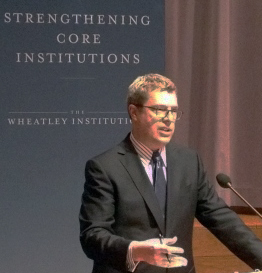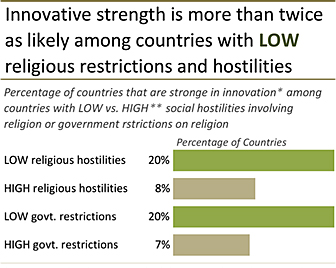Scharffs’ “Our Fractured Attitude Towards Corporate Conscience” #1 on SSRN

Note 25 June 2014: Dean Brett Scharffs’ paper Our Fractured Attitude Towards Corporate Conscience, is #1 on the download list of the Social Science Research Network (SSRN) Human Rights & the Corporation eJournal for the period 26 April 2014 to 13 August 2014. Click here to view the list. Click here to download this important and timely paper.
Brett G. Scharffs, Associate Director of the International Center for Law and Religion Studies, Francis R. Kirkham Professor of Law, and Associate Dean for Faculty and Curriculum at the J. Reuben Clark Law School, presented the paper “Our Fractured Attitude Towards Corporate Conscience” at the Wheatley Institution’s Religious Liberty Lecture Series …
Elizabeth Clark on The Morning Show, BYU Radio

Professor Elizabeth Clark, Associate Director for International Center for Law and Religion Studies of the J. Reuben Clark Law School, spoke on April 15, 2014, with Marcus Smith on BYU Radio’s The Morning Show. As principal drafter of the Center’s amicus brief in the cases Sebelius v. Hobby Lobby and Conestoga Wood Specialties v. Sebelius, which were heard in March 2014 before the United States Supreme Court, Professor Clark shared her expertise on the subject of these cases — religious freedom in the corporate world. The cases involved owners of for-profit corporations who, as devoutly religious people, challenged requirements of the “Obamacare contraception mandate” that require them to provide to their employees what they consider to be abortion-causing drugs….
International Conference: Magna Carta, Religion and the Rule of Law

The conference “Magna Carta, Religion and the Rule of Law”, featuring leading experts from Europe and North America, took place at The Temple Church in London on Saturday 7 June 2014. Conveners of the conference were Robin Griffith-Jones, Master of the Temple, and Mark Hill QC, Bencher of the Inner Temple, with Professor Robert Blackburn, Kings College London. The keynote address was given by The Rt Hon. The Lord Judge of Draycote, former Lord Chief Justice of England and Wales. The conference was followed by a participative workshop on the morning of Sunday 8 June, led by Professor David Kirkham of Brigham Young University.
IASJF Symposium “Family and Religion: Juridical Dimensions”

The International Academy for the Study of the Jurisprudence of the Family (“IASJF”) held its seventh international symposium on Monday and Tuesday, June 9-10, 2014, at the Faculty of Law, University of La Coruña, Spain. The symposium focused on “Family and Religion: Juridical Dimensions,” addressing the issues related to the topic from a juridical point of view. Selected submitted papers from the 2014 Symposium will be published in the International Journal of the Jurisprudence of the Family.
Pew Research: Religious Hostilities Reach Six-Year High

Pew Research Religion & Public Life, 14 January 2014
The share of countries with a high or very high level of social hostilities involving religion reached a six-year peak in 2012, according to a new study by the Pew Research Center. A third (33%) of the 198 countries and territories included in the study had high religious hostilities in 2012, up from 29% in 2011 and 20% as of mid-2007. Religious hostilities increased in every major region of the world except the Americas. The sharpest increase was in the Middle East and North Africa, which still is feeling the effects of the 2010-11 political uprisings known as the Arab Spring.1 There also was a significant increase in religious hostilities in the Asia-Pacific region, where China edged into the “high” category for the first time.
The…
Religious Freedom Linked to Economic Growth, Finds Global Study

Washington, D.C., May 29, 2014 – Religious freedom is one of only three factors significantly associated with global economic growth, according to a new study by researchers at Georgetown University and Brigham Young University. The study looked at GDP growth for 173 countries in 2011 and controlled for two-dozen different financial, social, and regulatory influences.
As the world navigates away from years of poor economic performance, religious freedom may be an unrecognized asset to economic recovery and growth, according to this new study. The study examines and finds a positive relationship between religious freedom and ten of the twelve pillars of global competitiveness, as measured by the World Economic Forum’s Global Competitiveness Index (see example in chart at right).
The study, however, goes beyond simple correlations…